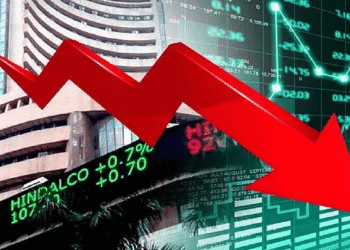MUMBAI (Economy India): Indian equity benchmarks began the trading week on a cautious and negative note, with both the Sensex and Nifty witnessing notable declines in early trade on Monday. The market mood remained subdued amid persistent foreign institutional investor (FII) outflows, weak global cues, and a lack of major domestic triggers.
At 9:45 AM, the BSE Sensex was trading at 82,267.54, down 232.93 points or 0.28%, while the NSE Nifty slipped 71.4 points to 25,078.45, breaching the psychologically important 25,100 mark.
Market Drivers: Foreign Outflows and Global Risk Sentiment
The primary reason behind the weak market opening is sustained selling by foreign investors. According to provisional exchange data, FIIs offloaded shares worth over ₹1,250 crore in the previous session. This selling pressure has continued into Monday’s trade as well.
Additionally, global markets remained mixed amid investor concerns over the US Fed’s monetary policy trajectory, trade uncertainties involving China and the United States, and softening demand in major economies.
“The global environment remains fragile. Investors are factoring in potential downside risks stemming from high interest rates, trade policy shocks, and geopolitical tensions,” said Neerav Doshi, Technical Research Head at Quantum Securities.
Sectoral Performance: Broad-Based Weakness
Most sectoral indices were trading in the red, with notable weakness in:
- IT stocks, dragged by fears of a slowdown in global tech spending.
- Financials and banks, as concerns over tightening global liquidity impacted investor appetite.
- Metals and commodities, due to sluggish demand signals from China.
On the other hand, select FMCG and pharma stocks offered minor support to the benchmarks.
Top Movers and Shakers
Among the top laggards on the Sensex were Infosys, HDFC Bank, Tata Steel, and ICICI Bank, each shedding between 0.5% to 1.2% in early trade. On the Nifty, Wipro, JSW Steel, and Adani Ports also saw declines.
Meanwhile, Nestle India and ITC were among the few gainers, offering some cushion to the falling indices.
Expert View: Short-Term Volatility Likely to Continue
Market analysts believe that Indian equities are likely to remain volatile in the near term due to global macroeconomic concerns and foreign capital flight.
“While the domestic economy remains resilient, our markets are not immune to external shocks. With FIIs exiting and global cues remaining shaky, short-term investors need to stay cautious,” said Dr. Meena Kapoor, Economist and Equity Strategist at ProView Financials.
Traders are also awaiting key domestic economic indicators such as WPI inflation data, corporate earnings from heavyweight companies, and updates from the US Federal Reserve’s policy outlook later this month.
Looking Ahead
If global sentiment improves and domestic earnings offer positive surprises, markets may regain some ground. However, a sustained rally will depend on a revival in FII flows, stability in global rates, and geopolitical clarity.
The Indian stock market’s early fall on Monday underscores the fragile nature of investor sentiment amid global headwinds. With volatility here to stay, both retail and institutional participants are expected to tread carefully over the coming sessions.
(Economy India)














